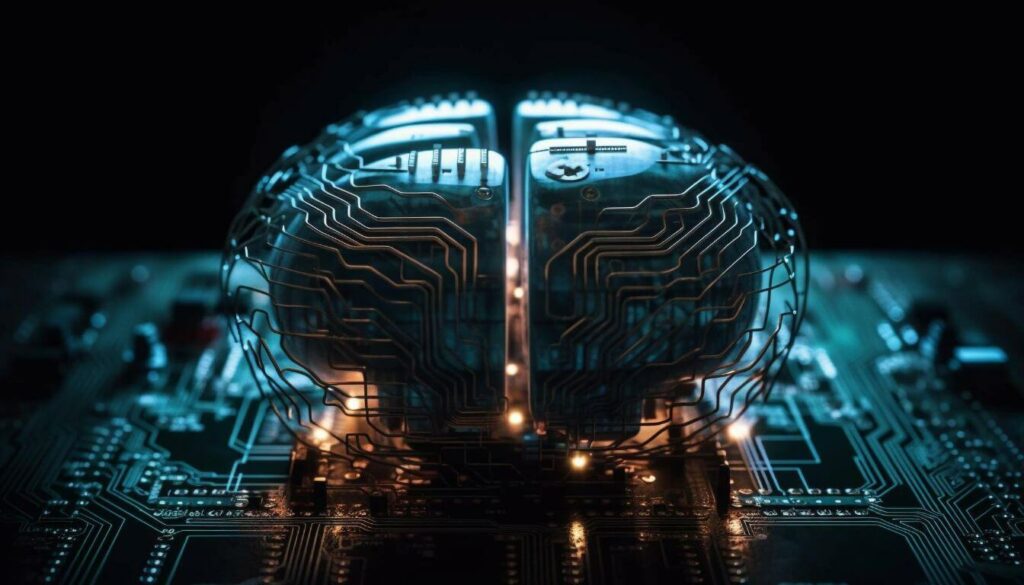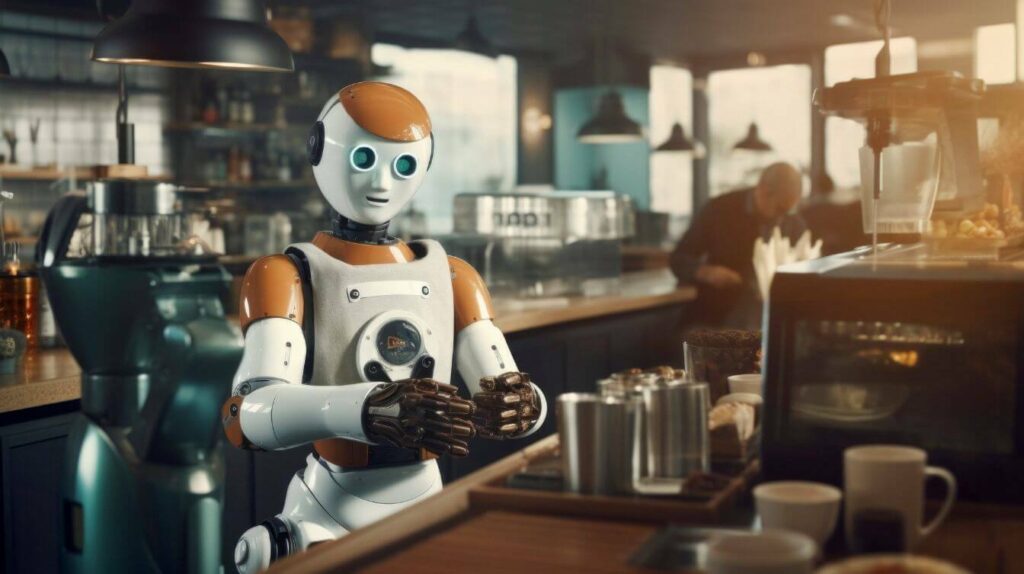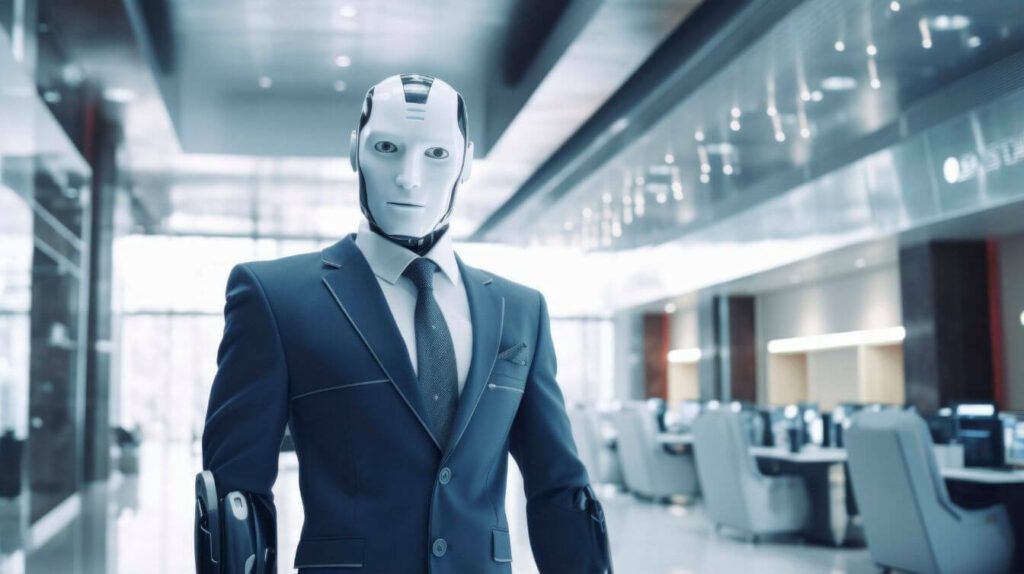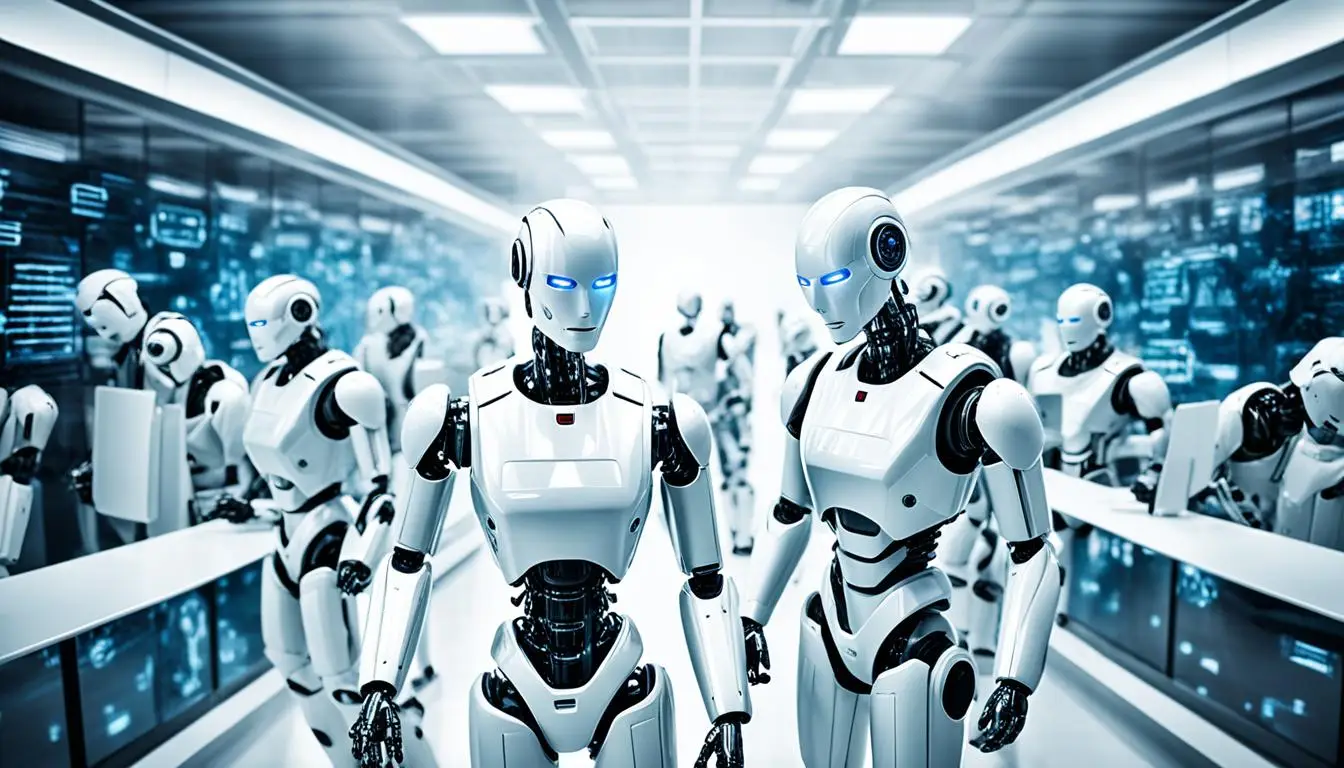Did you know that according to recent studies, artificial intelligence (AI) is expected to replace approximately 12% of jobs in the United States by 2030? The rapid advancements in AI technology are revolutionizing various industries and transforming the way we work. As AI continues to evolve, it’s essential to understand the potential impact on the job market and identify which professions are most at risk of being replaced.
In this article, we will delve into the top 10 jobs that are in danger of being replaced by AI. We’ll explore the changes AI is bringing to the job landscape and the potential consequences for workers in these professions. Join us as we navigate the fascinating world of AI and its far-reaching implications for the future of work.
Key Takeaways:
- Artificial intelligence (AI) is projected to replace 12% of jobs in the US by 2030.
- The rapid advancements in AI technology are reshaping various industries and transforming the way we work.
- Understanding the potential impact of AI on jobs is crucial for both workers and employers.
- In this article, we will explore the top 10 jobs most at risk of being replaced by AI.
- Join us as we dive into the implications of AI on the future of work and the opportunities it presents.
What is Artificial Intelligence (AI)?
Before delving further into the topic, it is important to establish a clear understanding of what artificial intelligence (AI) entails. This section will provide an overview of AI, demystifying the buzzword and exploring its various capabilities. We will explore concepts such as machine learning, deep learning, and the different applications of AI in industries. By gaining a solid understanding of AI, we can better grasp its potential to replace certain jobs and reshape the future of work.

Demystifying the buzzword: From machine learning to deep learning
In simple terms, artificial intelligence refers to the ability of machines to imitate human intelligence and perform tasks that typically require human cognitive abilities. Machine learning is a subfield of AI that focuses on enabling machines to learn from data and make accurate predictions or decisions without being explicitly programmed. Deep learning, on the other hand, is a subset of machine learning that mimics the structure and functionality of the human brain’s neural networks, allowing machines to analyze and interpret complex patterns in data.
Generative AI, a technique within AI, involves creating new content such as images, videos, or text based on patterns and examples from existing data. This capability opens up possibilities for creative applications, such as generating realistic artwork or writing realistic-sounding text.
AI’s capabilities: From data analysis to decision-making
Artificial intelligence has a wide range of capabilities that extend beyond data analysis and decision-making. AI tools can process vast amounts of data and extract valuable insights, enabling businesses to make data-driven decisions and optimize processes. AI-powered systems can also automate repetitive tasks, freeing up valuable time for employees to focus on more complex and strategic activities.
One example of AI technology is ChatGPT, a language model developed by OpenAI. ChatGPT uses deep learning techniques to generate human-like text responses based on prompts, allowing for natural and engaging conversations. AI could potentially assist customer service representatives by providing automated responses or even acting as virtual assistants in certain scenarios.
A glimpse into the future: How AI will shape industries and society
The potential of AI to replace certain jobs and reshape industries is both exciting and challenging. While AI could automate routine tasks and improve efficiency, there are concerns about job displacement and the need for reskilling or upskilling to adapt to the changing job market.
However, it’s important to note that AI is not intended to completely replace humans. Rather, it aims to augment human capabilities and enhance productivity. By leveraging AI tools and technologies, individuals and organizations can unlock new possibilities, improve decision-making, and drive innovation.
The AI Revolution: Transforming Industries and Reshaping Careers
AI has left a profound impact on various industries, transforming the way businesses operate and shaping career pathways. As AI continues to advance, certain sectors are particularly exposed to its disruptive power. Manufacturing and transportation, for example, are at the forefront of AI implementation, where automation and robotics are revolutionizing traditional processes.
In the manufacturing industry, AI-powered robots are taking over tasks that were previously performed by human workers. These intelligent machines can handle complex assembly line operations with speed and precision, reducing the need for human labor. Similarly, in transportation, self-driving cars and trucks are being developed and tested, potentially replacing the need for taxi drivers and long-haul truckers in the future.

Aside from manufacturing and transportation, AI is also making its mark in other sectors. Retail, for example, has seen the rise of cashier-less stores, where AI-powered systems handle the transaction process, eliminating the need for human cashiers. Moreover, AI tools like chatbots and voice recognition technology are increasingly used in customer service, providing 24/7 support and reducing the reliance on human representatives.
While AI is transforming many industries, it is important to note that the impact on jobs is not limited to manual or routine tasks. Even professional roles, like loan officers and paralegals, are being affected by AI advancements. AI algorithms can streamline loan processing, making it faster and more efficient, while AI-powered software can assist lawyers with research and document review, enhancing their productivity.
These examples illustrate the potential of AI to replace jobs across various sectors. As the technology continues to advance, more jobs are likely to be affected. It is therefore crucial for individuals and organizations to leverage AI tools and technologies, adapting to this new era of work and exploring opportunities for collaboration between humans and AI systems. The AI revolution is real, and it is reshaping industries and careers as we know them.
Is Your Job Safe? Assessing Your Vulnerability to AI

While certain professions may seem more susceptible to AI displacement, individuals in all fields must assess their vulnerability. When determining the likelihood of a job being replaced by AI, there are key factors to consider:
Repetitive tasks
Jobs that involve repetitive tasks, such as data entry or assembly line work, are more likely to be automated. AI excels at performing monotonous tasks with precision and efficiency, making it a potential replacement for these roles.
Data-driven decisions
Jobs that heavily rely on data analysis and decision-making processes are also at risk. AI’s ability to process vast amounts of data quickly and make informed decisions poses a challenge to professionals in fields like finance, marketing, and logistics.
Warning signs
There are warning signs that indicate when automation might be knocking on your door. Pay attention to technological advancements within your industry and the adoption of AI tools like chatbots (e.g., AI chatbots, AI-powered chatGPT) that are designed to handle customer inquiries and support.
By evaluating these factors, individuals can gain a better understanding of the potential impact of AI on their career paths. It is essential to stay informed about the advancements in AI automation and the future of jobs, especially in fields like software engineering that involve complex problem-solving and creativity. Being proactive and adaptable is the key to thriving in the evolving job market affected by AI.
What Jobs Will Artificial Intelligence Replace? Top 10 Most at Risk of Being Replaced by AI
In this section, we will explore the top 10 jobs that are most vulnerable to AI displacement. These include:
1. Data Entry Clerks: Automated data processing takes over
Data entry clerks, who are responsible for inputting data into systems, are at high risk of being replaced by AI. Automated systems can process data faster and with greater accuracy, eliminating the need for human input.
2. Assembly Line Workers: Robots replacing human labor on the factory floor
Assembly line workers, who perform repetitive tasks in manufacturing, are increasingly being replaced by robots. These machines can work faster and with higher precision, resulting in increased productivity and cost savings for companies.
3. Telemarketers: AI-powered chatbots handling sales calls
Telemarketers, who make sales and marketing calls, are being replaced by AI-powered chatbots. These virtual agents can handle customer inquiries, provide product information, and even complete sales transactions without the need for human intervention.
4. Bookkeeping Clerks: AI software crunching numbers with precision
Bookkeeping clerks, responsible for maintaining financial records, are at risk of being replaced by AI software. AI algorithms can accurately analyze financial data, reconcile accounts, and generate reports with greater efficiency.
5. Customer Service Representatives: AI chatbots providing 24/7 support
Customer service representatives, who handle customer inquiries and provide support, are being replaced by AI chatbots. These virtual assistants can offer instant responses, available 24/7, improving customer service and reducing costs for companies.
6. Taxi Drivers: Self-driving cars navigating the roads autonomously
Taxi drivers, whose jobs involve driving passengers to their destinations, are facing competition from self-driving cars. Autonomous vehicles can navigate roads without human input, potentially disrupting the traditional taxi industry.
7. Loan Officers: AI algorithms streamlining loan processing
Loan officers, who assess loan applications and make lending decisions, are being assisted by AI algorithms. These algorithms can analyze financial data, evaluate risks, and streamline the loan approval process.
8. Paralegals: AI assisting lawyers with research and document review
Paralegals, who provide support to lawyers by conducting legal research and reviewing documents, are increasingly relying on AI technology. AI-powered tools can quickly analyze vast amounts of legal data, improving efficiency and accuracy in legal processes.
9. Manufacturing Machine Operators: Robots handling complex tasks with speed and accuracy
Manufacturing machine operators, responsible for operating and monitoring machinery in factories, are being replaced by robots. These machines can handle complex tasks with speed and precision, reducing the need for human intervention.
10. Radiologists: AI analyzing medical images for faster and more accurate diagnoses
Radiologists, who interpret medical images to diagnose and treat patients, are being aided by AI technology. AI algorithms can analyze medical images, such as X-rays and MRIs, with speed and accuracy, assisting radiologists in their diagnosis and treatment planning.
Based on expert predictions and the current trajectory of AI development, these 10 jobs are among the most vulnerable to being replaced by artificial intelligence. By examining the specific tasks and responsibilities within each profession, we can gain a better understanding of how AI technology is poised to reshape the job market.
Beyond the Replaced: How AI is Creating New Opportunities?
While AI may pose a threat to certain jobs, it also creates new opportunities for individuals. The advancement of AI has given rise to a whole new category of jobs that are driven by AI technologies. These jobs require individuals with specialized knowledge and skills to leverage the power of AI and contribute to its further development.

The Rise of New AI-Driven Jobs: Software engineers, data scientists, and more
One of the major areas where new AI-driven jobs have emerged is software engineering. With the increasing complexity of AI systems, there is a growing demand for skilled software engineers who can develop and maintain these systems. Data scientists also play a crucial role in the AI ecosystem, utilizing AI tools and techniques to analyze and extract insights from large datasets. Other emerging AI-driven jobs include AI trainers, AI ethicists, and AI project managers, each contributing to the development and implementation of AI technologies.
Reskilling and Upskilling: Adapting your skills to thrive in the AI age
To capitalize on the opportunities created by AI, individuals need to reskill and upskill themselves. Adapting to the AI age requires gaining expertise in areas such as machine learning, data analysis, and AI programming. This can be done through online courses, workshops, and professional development programs. By acquiring these new skills, individuals can position themselves for new AI-driven jobs and enhance their career prospects.
The Human Edge: Creativity, critical thinking, and emotional intelligence remain irreplaceable
While AI technologies can execute tasks with speed and accuracy, certain qualities remain unique to humans. Creativity, critical thinking, and emotional intelligence are essential traits that cannot be replicated by AI. These human capabilities are highly valued in industries such as marketing, design, and healthcare. Therefore, individuals should focus on developing and enhancing these skills to complement the capabilities of AI.
Human-AI Collaboration: The future of work is a team effort
The future of work lies in collaboration between humans and AI technologies. Rather than replacing humans entirely, AI can be used to augment human capabilities and improve overall efficiency and productivity. Together, humans and AI can tackle complex problems, generate innovative ideas, and make impactful decisions. This collaboration will shape the future of work and enable the development of AI systems that align with human values and goals.
With the advances in AI and automation, the job market is undergoing significant transformations. While certain jobs may be at risk of being replaced by AI, new opportunities are also emerging in the AI-driven economy. By embracing the potential of AI, reskilling and upskilling, leveraging human traits, and collaborating with AI technologies, individuals can navigate the evolving job landscape and thrive in the AI age.
Conclusion: Embracing the Change, Shaping the Future
As artificial intelligence (AI) continues to advance and shape the job market, we need to embrace the changes and prepare ourselves for the future. The impact of AI on jobs is undeniable, and understanding and adapting to this transition is crucial for individuals and societies alike.
Understanding the Impact, Preparing for the Transition
AI advancements have the potential to greatly affect the job landscape, particularly in white-collar industries. While certain jobs may be at risk of being replaced by AI, it is important to remember that AI technology can also create new opportunities and enhance existing roles. By staying informed about AI models, regulations, and the likely jobs that could be created, we can address the changing needs of the job market.
Shaping the Future of Work: Advocating for Ethical and Responsible AI Development
As we embrace the potential of AI, it is crucial to advocate for ethical and responsible AI development. This ensures that AI technologies are developed and utilized in ways that maximize their benefits while minimizing any potential negative consequences. By shaping the future of work with ethical AI practices, we can create an inclusive and sustainable job market that benefits both individuals and society as a whole.
A New Era of Innovation and Opportunity: Embracing the Potential of AI
Instead of fearing AI as a threat, we should focus on the new era of innovation and the opportunity it presents. AI can help us automate repetitive tasks, improve decision-making processes, and enhance productivity. By leveraging AI technologies, we can drive positive change, enhance our skills, and unlock new possibilities for human creativity, critical thinking, and emotional intelligence that are irreplaceable by AI itself.
In conclusion, embracing the potential of AI and actively shaping the future allows us to navigate the evolving job landscape with confidence. By understanding the impact of AI, preparing for the transition, and advocating for responsible AI development, we can ensure that AI becomes a powerful tool that enhances our abilities and creates a better future for all.

